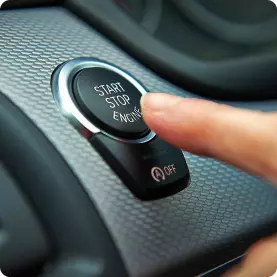MASSACHUSETTS OUI LAWS
Massachusetts refers to drunk driving as “Operating Under the Influence” (OUI) rather than DUI. The state has some of the strictest OUI laws in the country, with penalties that include license suspension, mandatory alcohol education programs, and the potential installation of ignition interlock devices for repeat offenders.

Getting Started
If you have been arrested for an OUI in Massachusetts, you will facing both administrative penalties from the Registry of Motor Vehicles (RMV) and criminal proceedings through the court system. This guide provides general information about the OUI process in Massachusetts.
Important Note: While this page provides detailed information, DUI.org does not offer legal advice. Laws can change, so consult a qualified DUI attorney for personalized guidance.
Definitions to Know
OUI (Operating Under the Influence)
Massachusetts’s legal term for driving while impaired by alcohol or drugs.
IID (Ignition Interlock Device)
A breathalyzer installed in your vehicle that prevents the engine from starting if it detects alcohol on your breath.
Massachusetts RMV (Registry of Motor Vehicles)
The state agency responsible for driver licensing, vehicle registration, and administering administrative license suspensions for OUI offenses.
Massachusetts Registry of Motor Vehicles
The Massachusetts Registry of Motor Vehicles (RMV) handles administrative license suspensions independently from any criminal proceedings. They are responsible for processing license suspensions, reinstating driving privileges, monitoring compliance with ignition interlock device requirements, and managing hardship license applications. The RMV works alongside the courts but operates under separate authority to enforce driving privilege penalties.
Steps to Take After OUI Arrest in Massachusetts
- Hire an Attorney
Legal counsel can help navigate both the administrative hearings with the RMV and the criminal court process.
- Address License Suspension
Your license will be automatically suspended if you either fail a breathalyzer test (0.08% BAC or higher) or refuse to take one.
- Request an Administrative Hearing
You have 15 days to appeal an administrative license suspension with the RMV.
- Apply for a Hardship License
If eligible, you may apply for a hardship license that allows limited driving privileges for work, education, or medical purposes.
- Install an IID
For certain offenses, particularly if you are convicted with multiple OUIs and seeking license reinstatement or hardship licenses, you will be required to install an ignition interlock device (IID).
- Complete Substance Abuse Evaluation
You will need to complete an alcohol assessment and any recommended treatment programs.
- Pay Fines and Fees
OUI convictions come with substantial fines, court costs, and RMV reinstatement fees.
- Complete Alcohol Education Program
First-time offenders typically must complete the state’s 24D alcohol education program.
- Attend Court Proceedings
Your criminal case will proceed through the court system separately from the RMV administrative actions.
- Probation
If convicted, you may be placed on probation with specific terms such as alcohol monitoring and regular check-ins.
- Avoid Further Violations
Additional OUI offenses while on probation or with a suspended license will result in much harsher penalties.
OUI Laws in Massachusetts
What Are the Legal Driving Alcohol Limits in Massachusetts?
In Massachusetts, it’s illegal to operate a motor vehicle if you’re under the influence of alcohol, drugs, or a combination of substances. The state defines specific blood alcohol concentration (BAC) limits that constitute per se evidence of impairment. Law enforcement typically uses breathalyzers to measure your Breath Alcohol Concentration (BrAC) during traffic stops.
| Driver Category | Legal BAC Limit |
| Drivers 21 and older | 0.08% |
| Commercial Drivers | 0.04% |
| Drivers under 21 | 0.02% |
Felony vs Misdemeanor OUI Charges
Whether Massachusetts, charges you with a misdemeanor or felony OUI depends primarily on your number of prior offenses and whether the incident resulted in serious injury or death.
A first or second OUI offense is typically charged as a misdemeanor in Massachusetts, carrying penalties that include license suspension, fines, and possible jail time. However, an OUI becomes a felony under the following circumstances:
- Third or subsequent OUI offense
- OUI resulting in serious bodily injury (called OUI causing serious injury)
- OUI resulting in death (vehicular homicide while under the influence)
Felony OUI convictions carry much harsher penalties, including longer mandatory minimum prison sentences, extended license suspensions or revocations, and substantially higher fines.
What Are Drunk Driving Diversion Programs in Massachusetts?
Massachusetts offers the “24D” first-offender diversion program for eligible first-time OUI offenders. This program provides an alternative to standard criminal penalties and includes:
- Probation for one year
- Completion of a 16-week alcohol education program
- License suspension for 45-90 days (instead of the standard one-year suspension)
- Reduced fines
To qualify for the 24D program, you must be a first-time offender with no prior OUI convictions. The program is sometimes available to second-time offenders if their first offense occurred more than 10 years ago (often called the “Cahill” disposition).
Refusing a Chemical Test Under Massachusetts OUI Law
Massachusetts, like all states, has an “implied consent” law. When you drive on Massachusetts roads, you implicitly agree to submit to chemical testing if a law enforcement officer has reasonable grounds to believe you’re operating under the influence.
If you refuse a breathalyzer test in Massachusetts, the refusal cannot be used as evidence against you in criminal court. However, the automatic administrative license suspension for refusal is typically longer than the suspension for failing the test.
| Refusal Consequences | License Suspension | Additional Penalties |
| First Offense | 180 days | Cannot apply for hardship license during suspension period |
| Second Offense | 3 years | Cannot apply for hardship license during suspension period |
| Third Offense | 5 years | Cannot apply for hardship license during suspension period |
| Fourth or Subsequent | Lifetime | No driving privileges |
OUI Penalties & Consequences
Penalties for OUI Offenses in Massachusetts
Massachusetts imposes increasingly severe penalties for each subsequent OUI conviction. These penalties include jail time, fines, license suspension, and mandatory education or treatment programs.
First Offense
Potential Jail Time: Up to 2.5 years
Fines: $500-$5,000
License Suspension: 1 year (45-90 days with 24D program)
Additional Requirements: 16-week alcohol education program
Second Offense
Potential Jail Time: 30 days to 2.5 years
Fines: $600-$10,000
License Suspension: 2 years
Additional Requirements: 14-day inpatient treatment program
Third Offense
Potential Jail Time: 150 days to 5 years
Fines: $1,000-$15,000
License Suspension: 8 years
Additional Requirements: IID required for reinstatement
Fourth Offense
Potential Jail Time: 1-5 years
Fines: $1,500-$25,000
License Suspension: 10 years
Additional Requirements: IID required for reinstatement
Fifth or Subsequent
Jail Time: 2-5 years
Fines: $2,000-$50,000
License Suspension: Lifetime
Additional Requirements: No reinstatement possible
Aggravating Factors That Increase Massachusetts OUI Penalties
In Massachusetts, certain circumstances can significantly enhance the penalties for an OUI offense, potentially leading to more severe charges, longer jail terms, extended license suspensions, and higher fines:
- High BAC Level: BAC of 0.15% or higher results in enhanced penalties.
- Child Endangerment: Having a passenger under 14 years old adds a separate charge with additional penalties.
- Causing an Accident: Particularly if it results in property damage, injury, or death.
- Speeding or Reckless Driving: Combined with OUI, can lead to additional charges.
- Driving with a Suspended License: Adds separate charges with mandatory jail time.
- Multiple Substances: Being under the influence of both alcohol and drugs simultaneously.
- Refusing Medical Aid for Victims: If an accident occurs and the driver fails to help injured parties.
- Leaving the Scene of an Accident: Fleeing after an OUI-related crash adds significant penalties.
Driving Without a Valid License
Operating a vehicle while your license is suspended for an OUI in Massachusetts carries severe penalties, potentially worse than the original OUI offense. Consequences include:
- Mandatory minimum jail sentence of 60 days for a first offense of driving with a license suspended for OUI
- Fines ranging from $1,000 to $10,000
- Additional license suspension period of up to 1 year
- Potential vehicle impoundment or forfeiture
- Ineligibility for a hardship license during the new suspension period
Moreover, driving with a suspended license is considered evidence of disregard for the law, which may negatively impact your original OUI case and future driving privilege applications.
License Suspension
Who Determines if You Can Continue Driving After an OUI
In Massachusetts, two separate entities determine your driving privileges after an OUI arrest:
- Massachusetts Registry of Motor Vehicles (RMV): Handles the administrative license suspension process, which is automatic and immediate upon either failing a chemical test or refusing one. The RMV suspension occurs regardless of the outcome of your criminal case.
- The Court: Imposes additional license suspensions as part of criminal penalties if you’re convicted of OUI. Court-ordered suspensions typically begin after the administrative suspension ends.
These dual processes mean you could face two separate license suspensions for the same incident. The administrative process is focused on immediate public safety, while the criminal process determines long-term consequences based on legal guilt.
How Long Will Your License Be Suspended?
When your license is suspended in Massachusetts for an OUI, you cannot legally drive unless you obtain a hardship license. The duration of your suspension depends on both the offense number and whether you failed or refused the breathalyzer test.
| Offense | Failed Breathalyzer (≥0.08%) | Refused Breathalyzer |
| First Offense | 30 days | 180 days (6 months) |
| Second Offense | 30 days + 2 years (upon conviction) | 3 years |
| Third Offense | 30 days + 8 years (upon conviction) | 5 years |
| Fourth Offense | Lifetime | Lifetime |
Steps to Reinstate Your License
To reinstate your driver’s license after an OUI suspension in Massachusetts, you must complete several requirements:
- Serve the full suspension period
- Pay reinstatement fees ($500 for first offense, $700 for subsequent offenses)
- Complete the required alcohol education or treatment program
- Install an ignition interlock device (IID) if required (mandatory for second and subsequent offenses)
- Provide proof of active auto insurance
- Pass a re-examination test if required
The reinstatement process must be done in person at an RMV Service Center, and all outstanding obligations to the RMV or other Massachusetts agencies must be resolved before reinstatement.
Restoring Your Driving Privileges
After an OUI conviction in Massachusetts, the path to restoring your driving privileges involves several specific requirements and processes. Depending on your offense and circumstances, you may be eligible for restricted driving privileges before your full reinstatement.
Eligibility for a Hardship License
Massachusetts offers hardship licenses (also called work or Cinderella licenses) that allow limited driving during specific hours for essential purposes. Eligibility requirements include:
- For first offense OUI: Must serve at least 3 months of your suspension period
- For second offense OUI: Must serve at least 1 year of your suspension period
- For third offense OUI: Must serve at least 2 years of your suspension period
- No eligibility for fourth or subsequent offenses
- No eligibility during suspension for breathalyzer refusal (in most cases)
- Must demonstrate critical need for transportation for work, education, or medical treatment
- Must have enrolled in or completed required alcohol education programs
How to Apply for a Restricted Driver’s License
- Complete the hardship license application at the RMV
- Provide documentation proving hardship necessity (employment verification, medical documentation, school enrollment)
- Install an ignition interlock device (IID) if required (mandatory for second and subsequent offenses)
- Provide proof of enrollment or completion of required alcohol education program
- Pay the application fee ($100) and eventual reinstatement fee
- Attend a hearing with the RMV Board of Appeal or Hearings Officer
If approved, hardship licenses typically restrict driving to 12 hours per day, corresponding to your demonstrated needs.
Massachusetts Ignition Interlock Device (IID) Requirements
In Massachusetts, ignition interlock devices are mandatory for certain OUI offenders seeking license reinstatement or hardship licenses.
The IID program requirements include:
- Mandatory for all second and subsequent OUI offenders
- Must be installed in all vehicles you own, lease, or operate regularly
- Must be used for 2 years for second offenders
- Must be used for at least 4 years for third offenders
- Must be used for at least 10 years for fourth offenders
- Monthly maintenance and calibration required
- All tests are recorded and violations reported to the RMV
- You must pay all installation and monthly leasing costs (approximately $75-100 for installation and $60-90 monthly)
- Tampering with or attempting to circumvent the device results in extended requirements or new suspensions

Selecting the right ignition interlock provider can make a world of difference.
Insurance Requirements
While Massachusetts doesn’t require proof of financial responsibility specifically for OUI offenders, you must maintain active auto insurance to reinstate your license after an OUI suspension. The state has its own insurance verification system through the RMV.
Massachusetts does require proof of insurance when reinstating a license, and insurance rates typically increase significantly after an OUI conviction. Most insurance companies in Massachusetts will file the necessary documentation with the RMV to verify your coverage.

Let us help you find the right insurance coverage.
Substance Abuse Evaluation and Treatment
Massachusetts requires OUI offenders to undergo alcohol evaluation and education or treatment programs as part of the penalty and reinstatement process:
- First offenders typically must complete the 16-week “24D” alcohol education program
- Second offenders must complete a 14-day residential treatment program
- Multiple offenders may be required to complete more intensive treatment programs
- All programs must be approved by the Massachusetts Department of Public Health
- Completion certificates must be submitted to the RMV for license reinstatement
- Costs range from approximately $600 for first offender programs to several thousand dollars for residential treatment

Understand what to expect and how to prepare for a substance abuse evaluation.
FAQs About OUIs in Massachusetts
What’s the difference between OUI, DUI, and DWI in Massachusetts?
Massachusetts law uses the term OUI (Operating Under the Influence), though the terms DUI and DWI refer to the same offense.
Can I refuse a breathalyzer test in Massachusetts?
You can refuse, but it results in an automatic license suspension that is typically longer than the suspension for failing the test.
Will I need to install an ignition interlock device for a first OUI?
First offenders generally don’t require an IID unless the judge specifically orders it, but second and subsequent offenders must install one.
Can I get a hardship license while suspended for refusing a breathalyzer?
Generally no, breathalyzer refusal suspensions are not eligible for hardship licenses except in limited circumstances for first offenders.
How do OUI convictions from other states affect me in Massachusetts?
Massachusetts counts out-of-state OUI convictions when determining whether a new OUI is a first, second, or subsequent offense.
Sources
- Massachusetts Office of Public Safety. (n.d.). Drunk driving and drugged driving. Mass.gov. https://www.mass.gov/info-details/drunk-driving-and-drugged-driving
- Massachusetts Registry of Motor Vehicles. (n.d.). Massachusetts Registry of Motor Vehicles. Mass.gov. https://www.mass.gov/orgs/massachusetts-registry-of-motor-vehicles
- FindLaw. (n.d.). Massachusetts OUI laws. https://www.findlaw.com/state/massachusetts-law/massachusetts-oui-laws.html
- National College for DUI Defense. (n.d.). Massachusetts OUI laws. https://www.ncdd.com/massachusetts-oui-laws
- Massachusetts Office of Public Safety. (n.d.). Ignition interlock device program. Mass.gov. https://www.mass.gov/guides/ignition-interlock-device-program
- Massachusetts Department of Public Health. (n.d.). Massachusetts impaired driving program (MID) provider directory. Mass.gov. https://www.mass.gov/info-details/massachusetts-department-of-public-health-bureau-of-substance-addiction-services-licensed-and-court-approved-massachusetts-impaired-driving-program-mid-provider-directory
- Massachusetts Office of Public Safety. (n.d.). Massachusetts law about drunk or drugged driving. Mass.gov. https://www.mass.gov/info-details/massachusetts-law-about-drunk-or-drugged-driving
Get support.
What is next? We can help you through the process. Give us a little information and we can support you through the next steps.
All fields are required.